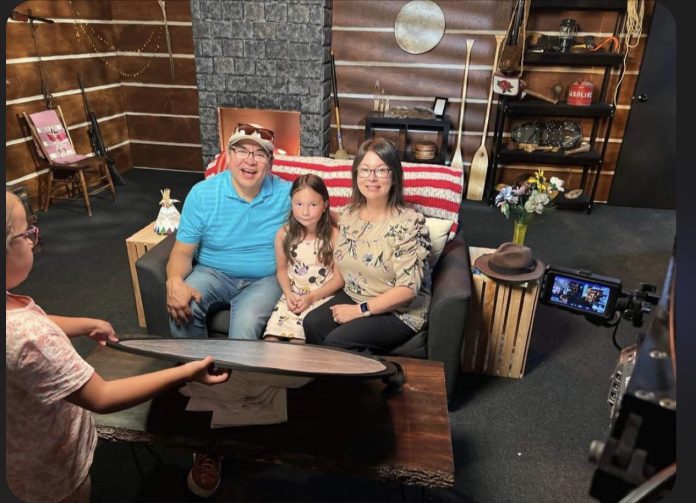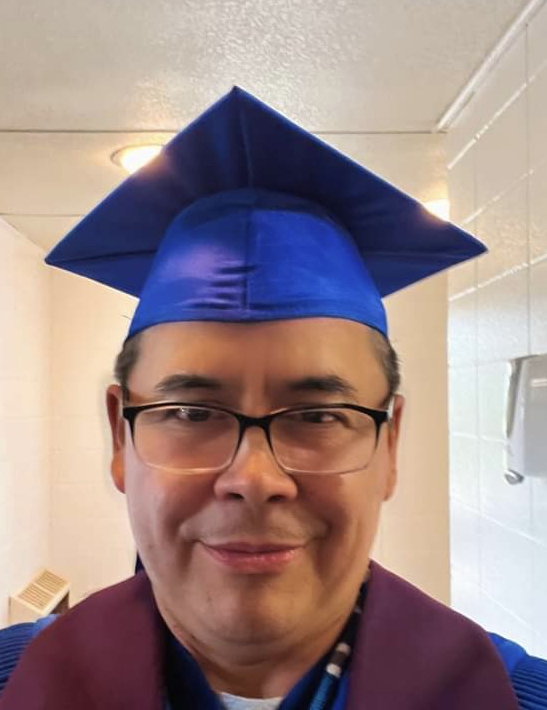

A milestone year, or perhaps, a culmination of years, for Morris Cook, a north Sask. resident and director of the Northern Saskatchewan Indigenous Teacher Education Program (NSITEP) who attained a PhD and became an actor, while living out a passion for his Woodland Cree language and culture.
Several years ago, Cook decided to work toward a doctorate degree. He explored his options and was accepted and things looked like they fell into place, until he talked with a friend. His friend advised him – if you’re going to do a PhD or doctorate, do it in something that you will enjoy doing; something you have a passion for, something you know that you’re going to spend the rest of your life doing,” Cook said.
Doctorate programs are time consuming, “rigorous” and the journey means giving up time with family, weekends and summers.
Cook took his friend’s advice and chose to apply to the University nuhelot’jne thaiyots’j nistameyimâkanak Blue Quills in St. Paul, Alta.
“I looked at where I come from as an Indigenous person and decided to do something that I would enjoy, and that’s what I did,” Cook said in an interview with the Northern Advocate. “It’s a cohort and so it’s like a little family.”
Blue Quills, formerly Blue Quills Education Centre and Blue Quills First Nations College (BQFNC) is a First Nations owned and operated university in Canada, the first of its kind in the country. The university is jointly owned by seven First Nation band governments: Beaver Lake, Cold Lake, Frog Lake, Whitefish Lake, Heart Lake, Kehewin, and Saddle Lake, and follows a ceremonial, spiritual path in its process.
Cook said the decision to attend gave him the opportunity to decide on how he would complete the requirement. He chose to do a project, rather than complete a thesis process, and created a Woodland Cree Knowledge Wheel.
The project took much research and creativity and involved five components – story, language, song, healing and traditions.
His inspiration for story came initially from his mother, who told him stories of the legendary figures including wîsahkîcahk (phonetically spelled weesahkeechahk).
“I researched story and, of course, they go back to memory and ceremony; they have a purpose and teachings and I have many storytellers,” Cook said.
“Stories have a number of functions, one to be entertaining, one to education and another to heal.”
His research included working with Elders and storytellers to find the origins of the language, which took him on a “migration back to the land, back to the sources of our stories, that sources – our ways of knowing,” which brought together tradition and healing. That included speaking with the late author Harold Johnson during his research.
“He was such a gem and I remember seeing a post of Harold just a couple of days before he passed … he said, and I quote, ‘the quest for story has given me much. And now I understand that everything is story.’ Everything is story, you can just tell your story … there’s a human journey in everyone, a narrative. It doesn’t matter who you meet. It could be a child; they have a story, they’ll tell you a story … that kind of (Johnson’s quote) cemented my final research paper to really focus on the meaning of these things, cause everything evolves around story.”
Language is important for Cook, a fluent Cree speaker and day-school and Intergenerational Residential School survivor, who was told not to speak his language growing up.
“Language takes us many places. There’s hurt, we tell stories. We all have trauma as Indigenous people, many, many anyway. I can’t say all. But, with the language comes healing.”
He spoke of the “very robust Cree resource unit” of the Lac La Ronge Indian Band (LLRIB). “We always draw upon them too, to give us some materials to educate our children” which was involved in the movement toward land-based education opportunities.
Song “has to do with Spirit, there’s vision there, it’s sacred, it’s a celebration so that it goes in many areas,” including instruments that are all made of natural substances. “There’s hide and wood and so on and their purpose is to heal, to tell story, to join in celebration; they are conduits for spiritual growth” taking many directions and leading to healing.
“I focused on wellness … wellness is really much attached to ceremony.”
Much of the journey through creating the Knowledge Wheel, took him back to “the best memories of my life on the trapline as in early child. The relationship with the land and all it’s elements. The land-based learning classroom. My first land-based learning classroom was the little cabin that I grew up in and my first teachers, of course, and my last, are the same two people, my Mom and my Dad. And with that perspective I look forward and I love getting back to the land cause it’s healing. Like being born to the land, like the places I love the most.”
Throughout the five years, Cook travelled to Blue Quills five times a year for five-day sessions, along with working to complete his project and all the PhD requirements.
Cook said the five years at Blue Quills connecting with his cohort were some of the best of his life—second only to getting married and watching his children grow.
”It propelled me years ahead in terms of my growth as a human being … it took me a long time … I’m so blessed to have been part of that process and to have family that I developed. They’ll be part of my life for the rest of my days and I’m so glad that the University of Blue Quills has taken it upon themselves to do this….
“By doing these programs, offering these degrees, we’re telling our story, were learning from the pinnacle of our people and we’re researching our knowledge keepers, our doctors, our philosophers and we’re starting to transcribe those into words, and we want to catalogue those ideas, those philosophies and those teachings for future generations. There is nothing wrong with that and nobody should ever feel threatened … we’re not trying to take over anything. We’re just trying to tell our story and that we have been here continuously. We want to continue to be here. We want to continue to know all of our ancestors since time immemorial, so some of the aspects of what Blue Quills [does], they do a tremendous job of doing the ceremonial part and maintaining and trying to keep the voice up. There are so many voices.”
With his graduation on June 23, 2022, Cook found time to go back to another passion from an earlier time in his life, performing.
While in high school in Stanley Mission, he was involved in the Drama Club, acting in several productions. The experience led him to consider acting as a profession.
At 17, he considered applying to the Native Theatre School of Canada, but when he didn’t find sponsorship and took another path.
When a colleague brought the call out for someone to play the lead role in the new series, Stories of the North, a new Campfire Story Video Production p a pilot partnership between Northern Light School Division (NSLD) and Métis Nation-Saskatchewan (MNS), Cook decided to apply.
“They sent me a script and told me to make a little video. … so I did that and used my daughter as my little model and doing the role play and I sent it to them and they like it.”
The filmmakers were looking for the right actor to play moshom (grandfather) in a 10-episode pilot, and quickly settled on Cook.
“When we saw Morris, we said, ‘This is the guy! He’s a natural in front of the camera and his grasp of the language is phenomenal, obviously now with his PhD, and he’s just so good with kids.,” said Kyle Burgess of Campfire Stories Video Production. “A lot of what we show in the show, a lot is him teaching the kids proper pronunciation. They (the grandchildren actors) weren’t fluent going into it. They were learning with him on camera.”
For Cook it meant learning lines, rehearsing and being on set for four days, while they completed 10 22-minute episodes of a production that originated as a Northern Healthy Community Partnership pilot project involving 10 original stories, written by La Ronge author, Calyn Stang.
The production also involved many northerners, Betty Ann Adam, as director, originally from Fond du Lac; Kevin Jackson, of La Ronge, as set designer; Harmony Johnson Harder, formerly of La Ronge, as one of the co-producers; and Crystal Seegerts from Black Lake, as illustrator, along with two child actors, Mya Hoskins Fiddler and Claire Walker, all of whom have either a La Ronge or northern connection.
And it brought Cook back to his passion, speaking and preserving his language.
“Acting is sometimes seen as very glorified, you know. It’s oh wow! But it’s a lot of work involved.
And “It was wonderful! Loved it! … Language is really, it’s of fundamental importance to me and also just showing that language is heard continuously beyond this generation. Our languages are being eroded so quickly, they’re disappearing before our eyes, you know, so whatever I can do to promote language and to preserve language, especially my own cause that’s the language I speak, Cree, you know, I’m going to do my best to do that.”
While, Cook has been completing his PhD and initiating an acting career, he says acting is a hobby. He has been the NSITEP director for close to five years and looking to the Graduation of the first class of student May 18, 2023.
“It’s been a blessing. I really enjoy what I do. [and Graduation] It’s a. big deal for us and I’m excited about it.”


